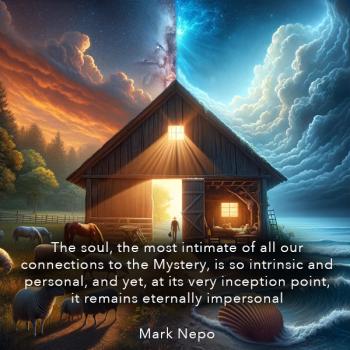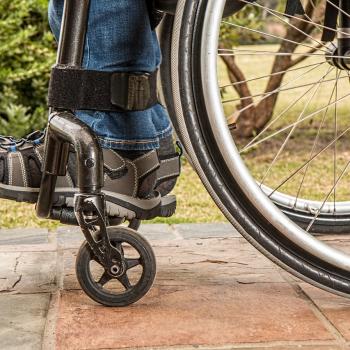Now Featured in the Patheos Book Club
Troubled Minds
Mental Illness and the Church's Mission
By Amy Simpson
Excerpted from Chapter Three, "Suffering People"
My mom's earlier symptoms of schizophrenia are much more obvious in hindsight. When my siblings and I were young, she had trouble reading books or following sermons, focusing on what other people were saying to her and making decisions. She had difficulty starting or carrying on conversations, expressing her thoughts and relating to other people. And others sometimes had trouble understanding what she was trying to say. She also found herself unable to express emotions, both verbally and nonverbally. She exhibited some social withdrawal, avoiding gatherings or get-togethers with family or friends. She lacked close friendships, and Dad thought she sometimes lacked good judgment.
However, her illness was not fully developed, and it was not clear that she had a mental disorder. What changed that was a reaction to stress.
The previous year, Dad had left his position as pastor of a small church, and our family had moved from a rural community to a city. My brother, Scott, the oldest of four kids, had started college and was living away from home (although nearby), and my older sister, Cheryl, would soon follow. With three teenage girls at home, family dynamics were sometimes rocky. My parents' relationship became strained as well.
Dad had been out of work for months, filling temp jobs while he looked for another pastoral position. Mom, who had spent the last twenty years as a homemaker, had no work either. She was terrified by city traffic and overwhelmed by the challenge of negotiating a new community. Finances were strained to the point of poverty. We had found housing in the bottom floor of an old two-story house, with two bedrooms and one bathroom and small-time drug dealers next door.
We were all making significant emotional and cultural adaptations—and struggling with the adjustments this transition required. For my mother, the stress of this time brought on the full blown psychosis of schizophrenia, with symptoms that were impossible to ignore and that made her almost completely nonfunctioning. As I've mentioned, through the years that followed, she was hospitalized repeatedly, medicated heavily and inconsistent in taking her medication. So one crisis was layered on another, and my family struggled to cope.
For me, this crisis meant developing an extreme sense of independence and responsibility for myself and my younger sister, Kate. I felt an even stronger sense of responsibility to care for Mom in her suffering and to try to "make her better." It also meant tremendous confusion about what was happening to my mom and to my family, a sense of shame that kept me silent and recurring grief that was so overwhelming at times, I had to lay my heart and soul aside when I went out into the world beyond our front door. My siblings had responses both similar to mine and unique to them.
The day my brother found Mom in a psychosomatic paralysis—her means of coping with her internal conflict between reality and delusion—was as traumatic for him as it was confusing and frightening for me. Of this time, Scott says, "I didn't have a clue how to respond. I was filled with a fear of what I didn't understand. I think the trauma was much worse for me than if it would have been a physical injury that I could at least understand."
Like mine, my brother's sense of responsibility inflated—and exploded into guilt. Although he was the first to experience the trauma of finding Mom in an incoherent state, because he was away from home he escaped much of the direct experience of living with a mentally ill parent. He says, "Since the most severe problems began after I was away from home, I have felt unmerited guilt that I was the only one who escaped without having to live as a teenager in a home with a mother who was severely mentally ill. I often feel pain as I think of the pain that my sisters lived through, and it makes it worse that I was somewhat removed from it."
Interestingly, this strong sense of responsibility and guilt arose in my older sister, Cheryl, as well. Without knowing that Scott was feeling responsible for all of us and I was feeling responsible for myself and my younger sister, she felt responsible for everyone and strove to take the burden on herself as much as she could to protect the people she loved.
Our home life revolved around protecting ourselves and preserving Mom's peace. Cheryl knew we needed to protect Mom's feelings and keep her from getting upset: "If there was a conflict, what mattered was not the truth of the event or our true feelings, but resolving it quickly in a manner that appeased Mom's feelings. It has always been, and continues to be, very difficult for me to be honest about my thoughts or feelings, especially if they may be in conflict with anyone else's. I definitely shut down emotionally, because acknowledging my feelings would require me to admit to them, and that would be too difficult."




